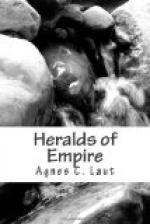One sturdy watch, I mind, stood his guard, laying about with a stout pike in a way that broke our fine revellers’ heads like soft pumpkins; but him they stood upon his crown in some goodwife’s rain-barrel with his lantern tied to his heels. At the rush of the rabble for shelves of cakes and pies, one shopman levelled his blunderbuss. That brought shouts of “A sweat! A sweat!” In a twinkling the rascals were about him. A sword pricked from behind. The fellow jumped. Another prick, and yet another, till the good man was dancing such a jig the sweat rolled from his fat jowls and he roared out promise to feast the whole rout. A peddler of small images had lingered to see the sport, and enough of it he had, I promise you; for they dumped him into his wicker basket and trundled it through the gutter till the peddler and his little white saints were black as chimney-sweeps. Nor did our merry blades play their pranks on poor folk alone. At Will’s Coffee House, where sat Dryden and other mighty quidnuncs spinning their poetry and politics over full cups, before mine host got his doors barred our fellows had charged in, seized one of the great wits and set him singing Gammer Gurton’s Needle, till the gentlemen were glad to put down pennies for the company to drink healths.
By this I had enough of your gentleman bully’s brawling, and I gave the fellows the slip to meet Pierre Radisson at the General Council of Hudson’s Bay Adventurers to be held in John Horth’s offices in Broad Street. Our gentlemen adventurers were mighty jealous of their secrets in those days. I think they imagined their great game-preserve a kind of Spanish gold-mine safer hidden from public ken, and they held their meetings with an air of mystery that pirates might have worn. For my part, I do not believe there were French spies hanging round Horth’s office for knowledge of the Fur Company’s doings, though the doorkeeper, who gave me a chair in the anteroom, reported that a strange-looking fellow with a wife as from foreign parts had been asking for me all that day, and refused to leave till he had learned the address of my lodgings.
“’Ave ye taken the hoath of hallegiance, sir?” asked the porter.
“I was born in England,” said I dryly.
“Your renegade of a French savage is atakin’ the hoath now,” confided the porter, jerking his thumb towards the inner door. “They do say as ’ow it is for love of Mary Kirke and not the English—”
“Your renegade of a French—who?” I asked sharply, thinking it ill omen to hear a flunkey of the English Company speaking lightly of our leader.
But at the question the fellow went glum with a tipping and bowing and begging of pardon. Then the councillors began to come: Arlington and Ashley of the court, one of those Carterets, who had been on the Boston Commission long ago and first induced M. Radisson to go to England, and at last His Royal Highness the Duke of York, deep in conversation with my kinsman, Sir John Kirke.




